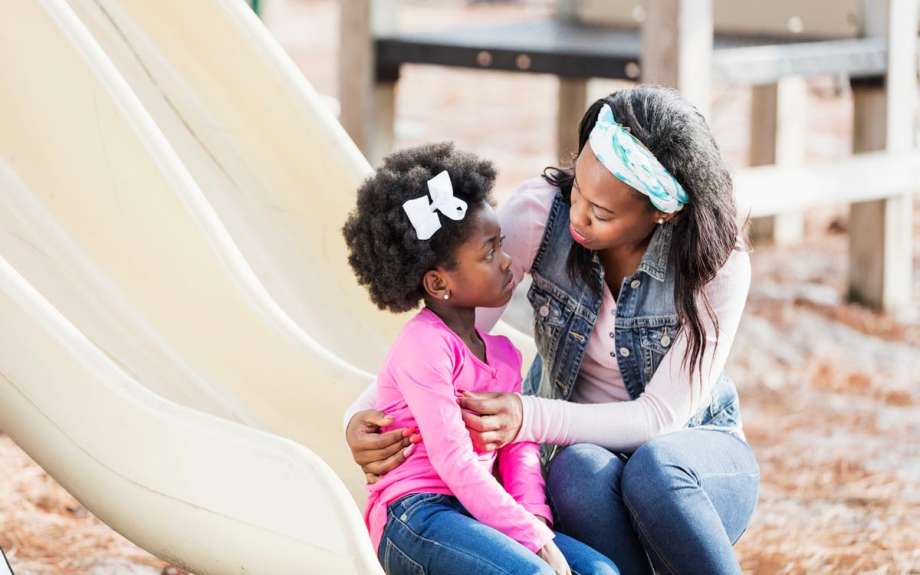The Ultimate Guide to the Tone of Voice to Use When Disciplining Kids

Many parents use a stern voice while disciplining, but an empathetic and understanding tone is actually more effective. The key is to be genuine about it.
More: 10 Signs Your Child is About to Have a Temper Tantrum
Tough Love or Laissez-Faire?
Discipline is one of the hardest parts of parenting, in part because we love our kids and we don’t want to see them suffer. Sometimes, in an effort to shield them from negative emotions, parents are too permissive. These parents don’t really discipline at all. Sadly, kids without sufficient structure and consistency grow up to be less-well equipped to handle adulthood.
Many parents do realize the need to discipline their kids. They understand that holding kids to behavioral expectations is part of being a loving parent. However, these parents often interpret that to mean that they should use a stern voice or even yell at their kids when correcting their conduct.
Don't have time to read now? Pin it for later:

In truth, shouting or speaking with a harsh tone is not the best way to discipline. Bearing in mind that “discipline” means “to teach”, consider the fact that this approach actually inhibits a child’s ability to learn. Kids who are being berated shut down.
Positive Parenting Coach and Love and Logic for Early Childhood Facilitator Heather Wallace explains, “If you give commands, or give a consequence with your ‘mean voice’, their brains will automatically kick into fight or flight. This will cause major resistance.”
Taking an Empathetic Approach to Discipline
Remember the permissive parents we talked about earlier? These parents struggle to put their foot down because they do not wish to see their kids struggle with negative experiences. Clearly, this approach is not the right one, but let’s take a deeper look at its motivation.
Parents hurt when their kids hurt. Instead of dropping all rules, which leads to more hurt in the future, and instead of “acting tough”, which is not effective, I want to offer you a different approach.
Deliver consequences with an empathetic tone. That means your voice is calm and comes from a place of love and understanding. Show your child that you love them while you discipline them.
There is no need to be harsh. The world is already harsh, and you can lovingly step back and allow your child to face its natural consequences, while also being there for them.
In a nutshell: let the consequences speak for themselves. Hold true to your limits while speaking in a loving and empathetic tone.
But, My Kids Only Listen to My Mean Voice...
Parents often have trouble softening their tone, because a harsh one is so effective. There are a few things to consider here.
First, if you always yell, you will always need to yell. Continuing to rely upon a certain volume or tone of voice actually trains your kids to only listen when you use it. They know that you don’t mean what you say until you are yelling.
Next, a “mean voice” might work in the short term, but it fails in the long run. Not only are your kids not listening or retaining, but you are wearing the relationship down. As your kids age, you want them to trust you and remain open to your advice.
What If It’s Important or a Safety Issue?
Many parents save their harsh tone for “emergency situations”. When safety is an issue, they often shift their parenting strategy towards a more hardline approach. This obviously makes sense.
If your four-year-old is headed for the road, should you yell? Yes. Your intent, however, is not to punish. The purpose of yelling should be to get their attention. If you don’t regularly yell, this should be very effective. If you always yell or come down hard, you weaken the power of your voice in emergency situations.
Always respond to immediate danger. However, the followup discipline is best executed in what Heather Wallace describes as “an empathetic and worried voice”. She elaborates, “That doesn’t mean I don’t raise my voice in these dangerous situations to immediately get their attention. But all interaction after I get their attention will have genuine empathy and concern in my voice.”
How to Remain Empathetic When You are Frustrated
Even if you want to change your tone, kids don’t always make it easy. So what about when you are completely exasperated?
Before tackling the shift to an empathetic tone, focus on remaining calm. Take deep breaths or even put yourself on “time out” to recollect. When you do speak, using a sing-songy voice can help you sound positive when you aren’t feeling it.
Next, really tap into your love for your child. Discipline describes our task to teach our children how to be successful as they grow and mature. We know full well how difficult and challenging it can be to learn from our mistakes. Get genuine with your empathy. Remind yourself how much you care for your child. When you really feel it, communicating empathy through your tone will become easier.
While this advice may help with most kids, you might want to take a different approach when disciplining highly-sensitive kids.

